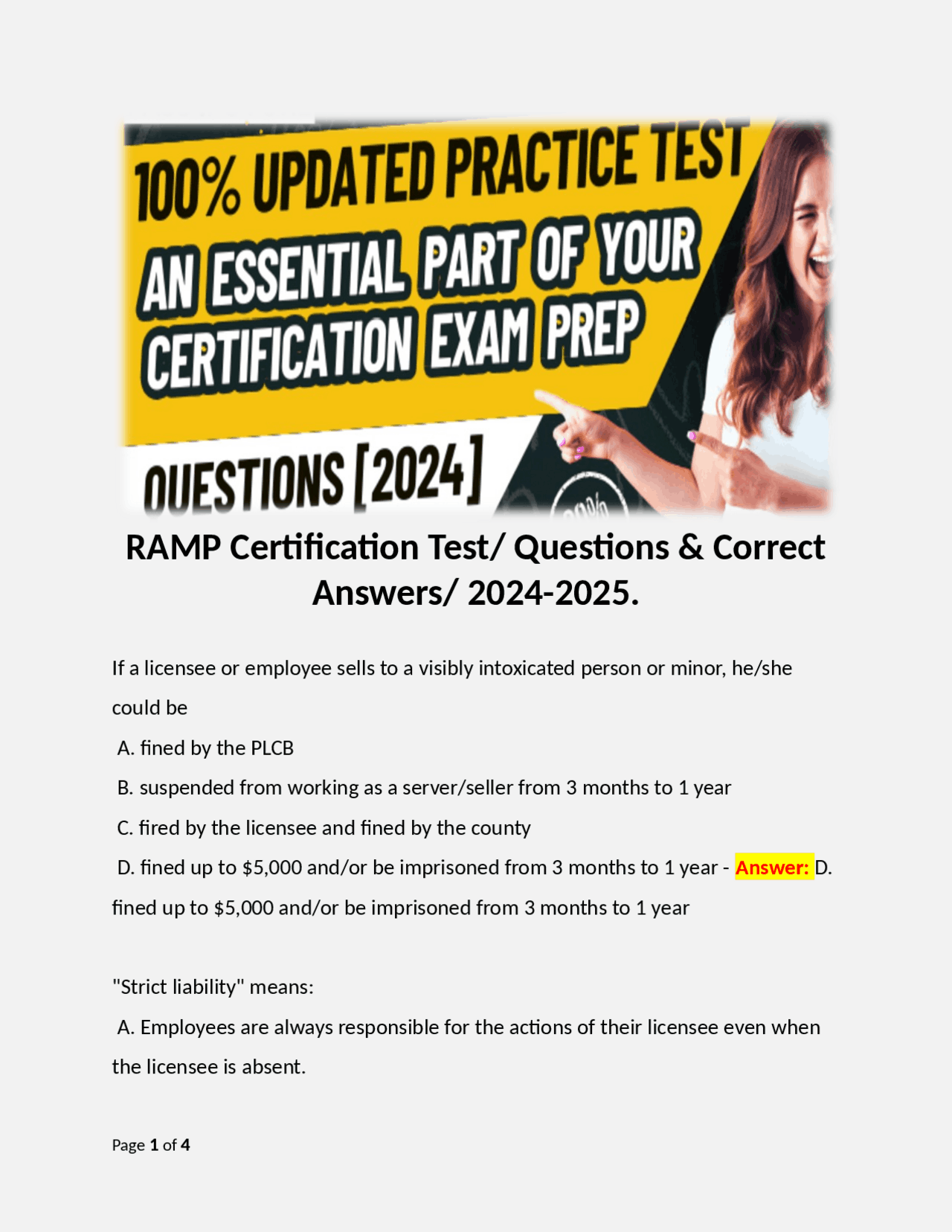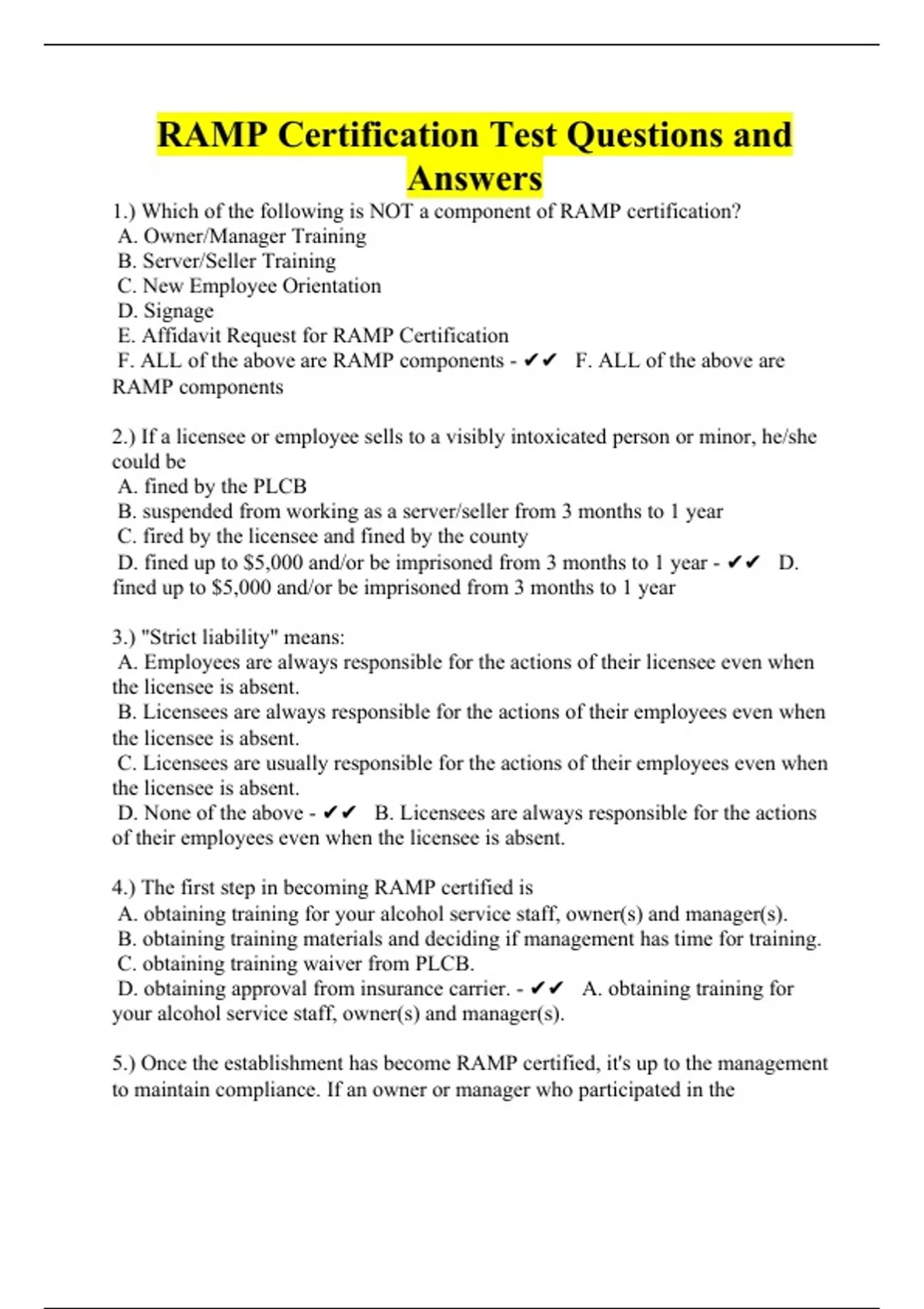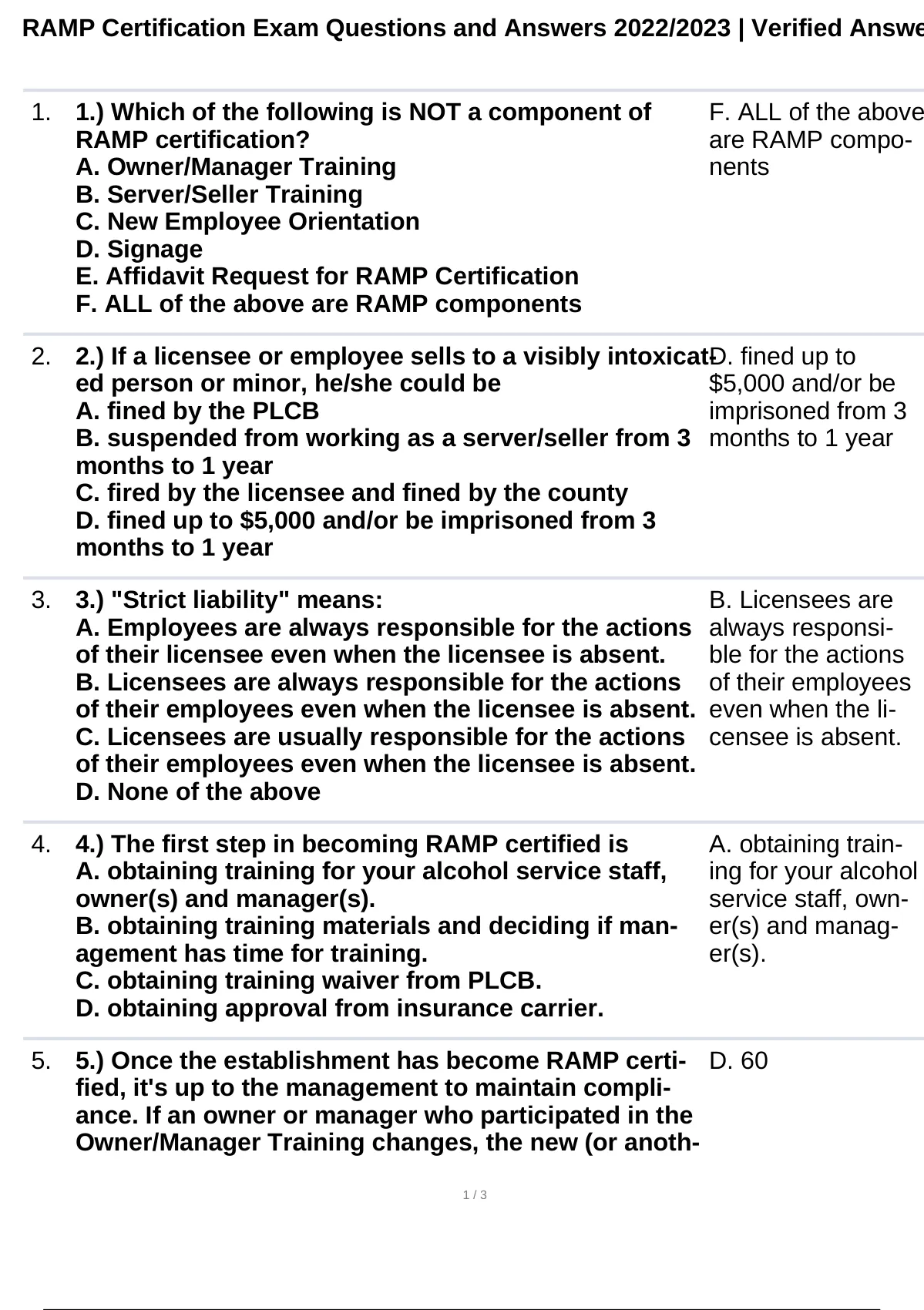Conquer the RAMP Exam: Answers and Strategies for Success
The Registered Apartment Manager (RAMP) certification, offered by the National Apartment Association (NAA), is a highly respected credential for professionals in the apartment management industry. It demonstrates a commitment to excellence and provides the knowledge and skills needed to excel in this competitive field. Passing the RAMP exam is a significant achievement, and this article provides a comprehensive guide, focusing on the key areas and answers you need to know to succeed. We’ll delve into the exam structure, crucial topics, and effective study strategies, giving you the tools you need to confidently approach the RAMP certification exam.
Understanding the RAMP Certification Exam
Before diving into specific answers and topics, it’s crucial to understand the exam itself. The RAMP exam is designed to assess your knowledge across a broad range of apartment management areas. Familiarity with the exam format and content is half the battle.
- Exam Format: The exam typically consists of multiple-choice questions.
- Content Areas: The exam covers topics like:
- Marketing and Leasing: Attracting residents, showcasing properties, and closing deals.
- Resident Relations: Managing resident communications, handling complaints, and building community.
- Property Maintenance: Understanding maintenance protocols, coordinating repairs, and ensuring property upkeep.
- Financial Management: Budgeting, rent collection, and financial reporting.
- Legal and Risk Management: Understanding fair housing laws, safety regulations, and lease agreements.
- Human Resources: Managing employees, handling performance reviews, and following labor laws.
- Passing Score: The passing score may vary, but thorough preparation is key.
Key Topics and Answers for RAMP Exam Success
Success on the RAMP exam requires a solid understanding of the core areas. Here’s a breakdown of key topics and information you should focus on:
Marketing and Leasing Mastery
- Target Audience: Understand how to identify and target the ideal resident demographic. Analyze market trends and tailor your marketing strategies accordingly.
- Marketing Channels: Know the advantages and disadvantages of various marketing channels, including online listings, social media, print advertising, and community outreach.
- Leasing Process: Master the leasing process, from initial inquiry to move-in. Understand the importance of fair housing compliance and ethical practices.
- Closing the Deal: Learn effective closing techniques and how to address resident concerns to secure leases.
Resident Relations: Building a Strong Community
- Communication Skills: Practice clear and effective communication techniques to build positive relationships with residents.
- Conflict Resolution: Develop skills in resolving conflicts and addressing resident complaints professionally and efficiently.
- Community Building: Understand how to foster a sense of community through events, activities, and resident engagement initiatives.
- Customer Service: Prioritize providing excellent customer service to enhance resident satisfaction and retention.
Property Maintenance: Ensuring a Safe and Well-Maintained Property
- Preventative Maintenance: Understand the importance of preventative maintenance schedules and their impact on property longevity.
- Maintenance Requests: Learn how to prioritize and manage maintenance requests effectively and efficiently.
- Vendor Management: Know how to select and manage vendors for maintenance and repair services.
- Safety and Security: Understand safety regulations and how to ensure a safe living environment for residents.
Financial Management: Understanding the Numbers
- Budgeting: Learn how to create and manage property budgets, including income and expense projections.
- Rent Collection: Understand rent collection procedures, late fees, and eviction processes.
- Financial Reporting: Familiarize yourself with key financial statements, such as profit and loss statements and balance sheets.
- Cost Control: Identify opportunities for cost control and efficient resource management.
Legal and Risk Management: Protecting Your Property and Residents
- Fair Housing Laws: Thoroughly understand fair housing laws and how to ensure compliance in all aspects of property management.
- Lease Agreements: Master the terms and conditions of lease agreements and ensure compliance.
- Safety Regulations: Understand safety regulations related to fire safety, emergency procedures, and hazard communication.
- Risk Mitigation: Develop strategies to mitigate risks related to property damage, resident safety, and legal liabilities.
Human Resources: Managing Your Team
- Hiring and Onboarding: Understand the hiring process, from interviewing to onboarding new employees.
- Performance Management: Learn how to conduct performance reviews, provide feedback, and address performance issues.
- Employee Relations: Foster a positive work environment and address employee grievances.
- Labor Laws: Familiarize yourself with labor laws, including wage and hour regulations and employee rights.
Effective Study Strategies for the RAMP Exam
Preparation is key to passing the RAMP exam. Here are some effective study strategies to help you succeed:
- Study Resources: Utilize the NAA’s provided study materials, including the RAMP textbook, online modules, and practice exams.
- Create a Study Schedule: Develop a structured study schedule and stick to it, allocating sufficient time to each topic.
- Practice Exams: Take practice exams to familiarize yourself with the exam format and identify areas where you need improvement.
- Review Weak Areas: Focus on your weaker areas and dedicate extra time to studying those topics.
- Join a Study Group: Collaborate with other aspiring RAMP professionals to share knowledge and support each other.
- Seek Mentorship: Connect with experienced apartment managers who can offer guidance and insights.
- Take Breaks: Schedule regular breaks to avoid burnout and maintain focus.
- Review and Revise: Consistently review and revise your notes and study materials.
Conclusion: Your Path to RAMP Certification
Passing the RAMP certification exam is a significant accomplishment that can significantly enhance your career prospects in the apartment management industry. By understanding the exam format, focusing on key topics, and utilizing effective study strategies, you can increase your chances of success. Remember to utilize the resources provided by the NAA, build a strong study plan, and practice consistently. Good luck with your exam!
Frequently Asked Questions (FAQs)
What is the best way to prepare for the RAMP exam? The best way to prepare is to thoroughly study the NAA’s provided materials, take practice exams, and focus on areas where you need improvement. Creating a study schedule and joining a study group can also be helpful.
How long does it take to prepare for the RAMP exam? The preparation time varies depending on your prior experience and study habits. Most candidates spend several weeks or months studying for the exam.
What happens if I fail the RAMP exam? You can typically retake the exam. The NAA provides information about retake policies and fees. Review your study materials and focus on your weak areas before retaking the exam.
Is the RAMP certification worth it? Yes, the RAMP certification is highly respected in the apartment management industry. It can lead to career advancement opportunities, increased earning potential, and enhanced credibility.
Where can I find RAMP exam practice questions? The NAA typically provides practice exams as part of its RAMP study materials. Additionally, there may be online resources and study guides that offer practice questions.




